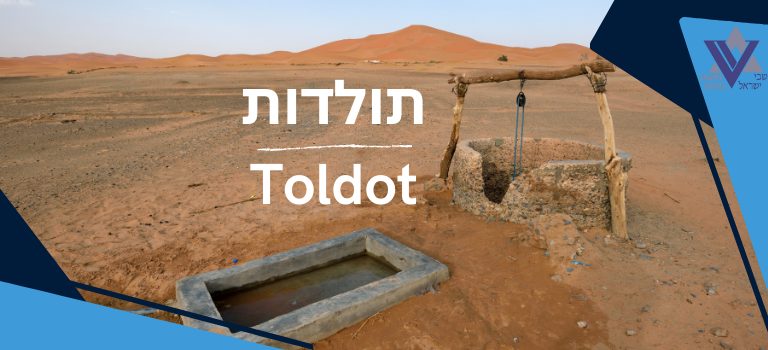
Parashat Toldot
This is the parsha of Yitzchak and Rivka’s life. Rivka has twins, Esav and Yaakov. Yaakov buys the birthright from Esav. Yitzchak goes to Gerar in a famine, is told not to leave the land, digs the wells Avraham dug and renews the pact with Avimelech. Yitzchak is elderly, plans to give the blessing to Esav but is deceived by Yaakov. Esav wants to kill Yaakov. Yaakov travels to Padan Aram so as not to marry a woman from Canaan.
1st Aliya (25:19-26:6) Yitzchak is 40 when he marries Rivka. He prays for her, as she is barren. She is troubled by her pregnancy, is told she has 2 nations in her womb and bears them when Yitzchak is 60. Yitzchak loves Esav, Rivka loves Yaakov. Yaakov buys the birthright from Esav for a pot of lentil soup. Yitzchak journeys to Gerar in a famine. G-d tells him not to go to Egypt but to dwell in the land, as it is promised to him.
This is the parsha of succession. Yitzchak has now taken Avraham’s place, Rivka taken Sarah’s. And already, the next generation is born. But Rivka is told that she has 2 nations in her womb. This revelation to her is crucial in understanding the later story of Yaakov stealing the blessing meant for Esav.
When we read the stories in the Torah we are at a distinct disadvantage. Because we know how the story turns out. After all, we read the Torah every year and we know these stories pretty well by now. But it is crucially important that we read the stories as if they are in real time, as if we don’t know the end. Rivka knows that her 2 sons are 2 nations. That’s all she knows. But what does that mean? Does it mean as we say colloquially: Tel Aviv and Jerusalem are 2 countries. Well, they aren’t really; but they are like 2 countries. Is that what 2 nations means? She doesn’t really have 2 nations in her womb, rather 2 very different types, but both are Jewish. And so, both Esav and Yaakov will be part of the Jewish people, just that they’ll be very different sorts. Or does it mean 2 nations literally? One of her sons will be in the Jewish people and one out. And if she had to choose one to be in, well, she loves Yaakov – for she sees in him the heir of Yitzchak. He will be in. Esav out.
And Yaakov, the son she loves – well, she must have told him this secret too. Yaakov, with this information surmises: If I am in and Esav out, then I have a problem. Because Esav is the first born. So, Yaakov remedies that; he buys the birthright from Esav. Working to ensure the Divine plan materializes.
2nd Aliya (26:7-12) Yitzchak and Rivka are in Gerar. He says she is his sister. Avimelech realizes she is his wife and challenges Yitzchak. Avimelech instructs all not to touch her. Yitzchak plants that year and the crop yield is 100-fold (meah shearim).
Yitzchak’s following in Avraham’s footsteps dominates the Parsha. Yitzchak married a woman who traveled to the land of Israel from Padan Aram, just like Sarah had. She is barren, as Sarah was. He goes to Gerar in a famine, like Avraham did. He says she is his sister, as Avraham had.
But with crucial differences. Yitzchak plants crops in a famine. And gets a 100-fold yield. Avraham never did that. He is told not to leave the land of Israel; Avraham left when he went to Egypt in a famine. And Yitzchak gets a double instruction not to leave the land: Dwell in the land (sh’chon b’aretz), Live in the land (gur b’aretz), something Avraham was never instructed.
Again, we have to put ourselves in real time. Yitzchak scratches his head – why am I not to leave the land? And what does it mean to get a double command – dwell and live in the Land?
Yitzchak follows in Avraham’s footsteps with one twist. He is taking active steps to build the infrastructure of a state. He assumes he is to dwell in the land because the promise of the Jewish people settling this land is coming true in his time. Well, to build a state you need to begin planting – shepherds are not state builders. Farmers are. He plants. And what would you think if you planted in a famine and got a 100-fold yield? G-d is with me. My state building is being rewarded from above. Time to take more steps to build the state.
3rd Aliya (26:13-22) Yitzchak prospers greatly, with many flock. He digs the wells Avraham dug but were filled in by the Philistines. Avimelech tells him to move away. He digs more wells of Avraham. Finally, when he digs wells that are not contested, he declares that he has been fruitful.
All the wells end well. That’s 5 well diggings. On the one hand, he is following in Avraham’s footsteps by redigging his wells. But, unlike Avraham, he is digging the wells for agriculture. The shepherd is transitioning to agriculture; for state building demands agriculture. These wells are for the wellbeing of the impending Jewish state. And the people of Gerar are onto him – they smell an adversary, intent on taking their land. Hence, they oppose his wells.
4th Aliya (26:23-29) Yitzchak journeys to Beersheva. G-d tells him not to fear, for He is with him as He was with Avraham. Yitzchak builds an altar and calls in G-d’s name. Avimelech comes to renew the pact, though if any harm be done to him, the pact is off.
Yitzchak goes to Beersheva, as Avraham did. G-d tells him not to fear, as He told Avraham not to fear. Avimelech makes a pact with him, as he did with Avraham. These are Avraham stories, repeated now with Yitzchak. Except Avimelech is afraid that Yitzchak will harm him. He senses that Yizchak is preparing for a state, something Avraham did not do. And this state will be at Avimelech’s expense.
5th Aliya (26:30–27:27) Esav marries at 40 taking Canaanite wives, to the consternation of Yitzchak and Rivka. Yitzchak is elderly. He instructs Esav to bring freshly caught venison after which he will bless him. Rivka interferes and instructs Yaakov to imitate Esav. Yitzchak is suspicious but Yaakov’s disguise is convincing.
This story of deception raises many questions. What was Yitzchak thinking in choosing to bless Esav? And what was Rivka thinking in this foiling of Yitzchak’s intent?
Again, we know the outcome. But let’s put ourselves in Yitzchak’s place. He is preparing for the impending state building. He planted. He dug wells for water. He is looking to the future. State building requires not only economic growth. It requires a military and thoughtful leadership.
Yitzchak figures both his sons are going to lead the next generation of the Jewish people. There is no reason to think otherwise; they are twins, both born of the same mother. And they are complementary leaders. Yaakov is the thoughtful leader. But military power is not his thing. It is Esav’s. A great pair. Just like Avimelech has Phicol, his general, Yaakov will have Esav as his general.
Yitzchak does not intend to bless just one son, but both. He intends to bless Esav in worldly matters, Esav’s strenth. To complement Yaakov, not replace him.
Rivka sees it all differently. Because she got that message when she was pregnant – 2 nations, not one. And if the Jewish people is going to be one of these 2 of my children, it isn’t going to be Esav.
6th Aliya (27:28-28:4) Yitzchak gives the blessing to Yaakov. Esav arrives soon after. When the deception is discovered, Esav is incensed, intent on killing Yaakov. Rivka urges Yitzchak to send Yaakov to Padan Aram to find a wife – and save his life.
The blessing, intended for Esav, is for agricultural blessing from the heavens. And power. In Yitzchak’s mind, the Jewish people will require economic success as well as military prowess. And that is the blessing to Esav – a perfect partner to Yaakov, the thoughtful leader.
However, Yaakov receives the blessing instead. Rivka follows in Sarah’s footsteps: Sarah banished Yishmael and G-d told Avraham to listen to her. Rivka, in her way, banishes Esav. And Yitzchak knows that in the end she is correct; that only one of their children will inherit the covenant, the other won’t.
7th Aliya (28:5-9) Esav sees that the Canaanite women he took are frowned upon. He marries Yishmael’s daughter.
Esav marries at 40, like Yitzchak. He takes a daughter of Yishmael, in other words, his cousin, as Yitzchak married Rivka, his niece. But it’s not just the walk – it’s also the talk. While trying to walk the walk, he is simply not getting that he need talk the talk as well. As such, he will not be the next generation of the Jewish people.
Written by: Rabbi Reuven Tradburks, Director of Machon Milton










